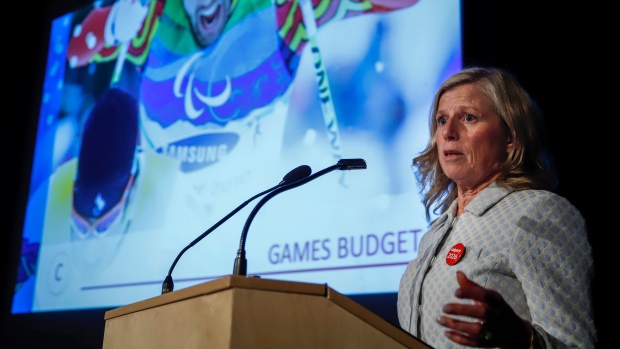Sep 11, 2018
Calgary 2026 says price tag of Winter Games would be $5.23B
Calgary councillors voted Tuesday to keep the city's bid for the 2026 Olympic and Paralympic Winter Games alive, after a draft plan presented to council revealed the total cost of hosting the games would be approximately $5.23 billion.
The Canadian Press

Calgary councillors voted Tuesday to keep the city's bid for the 2026 Olympic and Paralympic Winter Games alive, after a draft plan presented to council revealed the total cost of hosting the games would be approximately $5.23 billion.
After listening to the Calgary 2026 presentation, councillors voted in favour of a motion to proceed with a plebiscite on Nov. 13, when Calgarians will be asked to vote on whether they want the games.
Calgary 2026 bid corporation chief executive officer Mary Moran told council the $5.23 billion figure was calculated in 2018 dollars, and did not factor in the potential rate of inflation over the next eight years. She said the total could be $5.99 billion by 2026.
By comparison, the 2010 Winter Games in Vancouver and Whistler, B.C., cost roughly $7.7 billion.
Calgary 2026 said the required public investment from taxpayers — which would come from the city, provincial and federal governments — would be about $3 billion.
The remainder would be paid for privately via ticket sales, merchandising, licensing, corporate sponsorships and a contribution from the International Olympic Committee in cash and services.
How much each level of government would contribute has yet to be announced.
Calgary has not yet committed to bidding for the 2026 Winter Games. City council has reserved the right to pull the plug on the process at any time.
"Is there enough information here to go to the people and let the people decide in a plebiscite?" Mayor Naheed Nenshi asked prior to the vote on the plebiscite motion, which passed 12-3.
"Based on what I've heard today I certainly think that with the exception of the piece on the actual share from the provincial government, we're ready to go to a plebiscite.
"The province has promised that they will come forward with those provincial numbers in plenty of time for the vote."
The federal government's policy for hosting international sporting events allows for a contribution of up to 50 per cent, or $1.5 billion in this case, of public sector costs.
A new fieldhouse, which has long been a priority for Calgary, and a mid-size arena seating up to 6,000 were the only new venues proposed in the plan, although a curling venue has yet to be identified.
Edmonton is under consideration as a possible site for curling.
Existing facilities from the 1988 Winter Games in Calgary and Canmore, Alta., as well as the ski jump in Whistler from the 2010 Games would be used again in 2026.
"Our responsibility is to develop and promote a responsible bid," Moran said. "We're about four-and-a-half years in advance of when most (bid corporations) have this level of budgeting detail.
"We're very confident with the number we've put forward to the community.
"We're anticipating we will use eight existing venues and only build two new venues, which is a different approach than what most cities take, including some of the recent games."
The economic impact on Alberta's gross domestic product was estimated at $2 billion.
"This is the one initiative that will put people back to work right away," Moran said. "It will leave us with legacy infrastructure we can use for generations to come."
The IOC's deadline to submit a bid is Jan. 11. IOC members will vote on a host city Sept. 11, 2019.
A Calgary Bid Exploration Committee pegged the price of the 2026 Games at $4.6 billion in June 2017.
Calgary's draft plan proposes spending just over $500 million on upgrading and improving McMahon Stadium, Scotiabank Saddledome, the Olympic Oval, Canmore Nordic Centre, the sliding track and ski hill at WinSport and the alpine ski hill at Nakiska.
The plan does not include a new NHL-sized arena.
The city and Calgary Sports and Entertainment — owners of the NHL's Calgary Flames — have been in a stalemate for several months over who should pay how much for a new arena.
"The Saddledome, when the IOC came and did their site visit, they said it was adequate for the 50 days of the games and I would agree with that," Moran said.
"I can't comment on whether the Saddledome is adequate for a nine-month, 40-game season for the Flames. That's a separate conversation.
"If they come to an agreement, it would enhance the experience for both the athletes as well as the visitors, and we would reconfigure some of our venue deployment to accommodate that."
The security budget was estimated at $610 million, which is less than the $900 million required in Vancouver and Whistler.

